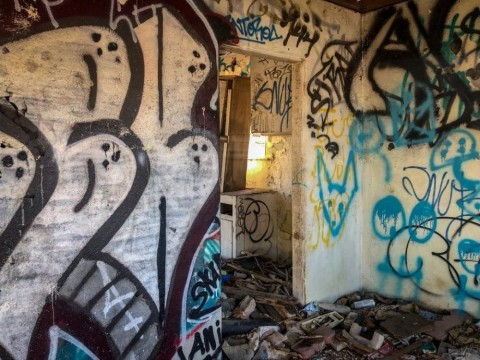Twenty minutes after your alarm goes off, you lie in bed, studying the ceiling. Your eyes follow the intricately carved lines, blue and orange and white, circling. You hum, breathe, pause. The world merges and blurs. You shut your eyes.
Your white neighbor’s cat is at your window, scratching at the pane. Its green slit eyes peer in, unblinking. You won’t let it in today. It paws, meows, struts off. You lazy in bed for another hour.
Your landlord’s bad music starts to float in. The old fool! Each morning, he strums away at his guitar, choking the air with distasteful notes. Each night, he invites his band of heavy drinkers, and they stand around the sitting room, chattering, disturbing your peace. You curse, press the pillows against your ears, squeeze your eyes shut. The sound stops. Your muscles relax. You hear him shuffling around the house. The door opens, closes. He is off to look after dogs.
A foot on the teak floor. Another foot. You loosen a crick in your neck. Your room is a mess of candy wrappers, books, shoes, unwashed clothes, and paper bags. You examine the dull hook at the center of the ceiling. How much weight can it bear? You think of the unopened bottle of Midol in your drawer. How much will ease the pain of living? Your feet slide into your elkhide slipper scruffs. You hug yourself. Hum. Breathe. Pause. It’s not fucking winter yet.
You walk to your desk, creaks rising around you. You flick on the lamp, sit. You push your Macbook to a corner, your unfinished dissertation to the floor, fling your Bible across the room. You extract a fresh A4, begin to write: “I choose to end my suffering. Living is suffering.” Argh, fuck this, fuck this! You shred the paper. It’s your life, after all, you need not summarize it for anyone. You cringe at the thought of your landlord reading it first.
It is six years since you left Nigeria. During your first month in Boston, you skyped home. You gossiped with your two siblings how absurd you found the American life: the bland foods that lacked the right amounts of salt and pepper, the obsessive obligation to put down toilet seats after urinating, the skimpily dressed white women whom you swore you could see through their underwear if they bent over, the litany of curse words when excited or annoyed or when things go wrong. You promised your parents you would send for them. You did not tell them that, yes, you were finally free in America and could date men. You did not tell them that you could not wait to experience falling in and out of love with men, kissing and being kissed. No one could judge you as a taboo in a country where you fell in love with white men but they wouldn’t love you back. You were rejected jobs that you were qualified for. You were offered cleaning jobs too easily. In America, you were black. People were careful not to touch you else they feared your blackness would rub off on them.
Six years after, you are struggling to finish your doctorate. You have no job yet. The white man, who you met in a bar and dated for a year, emails to say he is moving to Canada. He has found a position as a software engineer in a new startup. He says he is sorry.
You decide to clean your room. You change the covers of your bed, clean out your tiny closet, move your dirty clothes to the basement. You pile your notes in a corner, arrange your shoes on the rack. You dust, smother cobwebs, replace curtains.
It is a few minutes after eleven. You plan to die by eight the following day. A good time to leave this world. Your landlord, who you barely talk to, will not notice you until you begin to rot and your smell fills up his house. The cat will watch your body bloat each hour, and paw, and meow, and strut off to wherever. Your phone will teem with email notifications: one from your supervisor who will want to know why you never showed up at your seminar, another from the black man in your support group who says he is having another terrible depressive episode and is cutting himself with a razor and there is blood everywhere (Please come. I feel so numb.)
You walk out of the house, smile and say hello to everyone on the street. You take the bus to a park. You watch people come and go, birds hovering in the sky. You leave for home by six. You make a dinner of rice and chicken stew. You watch the TV until eleven. You are in your room, on your bed, studying the ceiling. You feel the corner of your bed, where you stuff magazines, and retrieve a handgun. You hold it to your head. You hum, breathe, stop.



 The core workshop of SmokeLong Fitness is all in writing, so you can take part from anywhere at anytime. We are excited about creating a supportive, consistent and structured environment for flash writers to work on their craft in a community. We are thrilled and proud to say that our workshop participants have won, placed, or been listed in every major flash competition. Community works.
The core workshop of SmokeLong Fitness is all in writing, so you can take part from anywhere at anytime. We are excited about creating a supportive, consistent and structured environment for flash writers to work on their craft in a community. We are thrilled and proud to say that our workshop participants have won, placed, or been listed in every major flash competition. Community works.